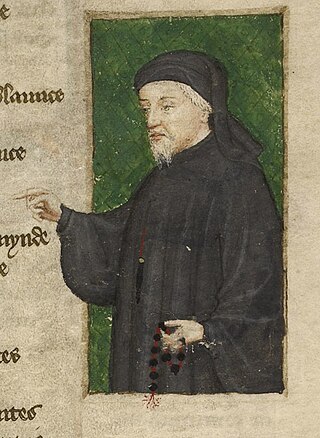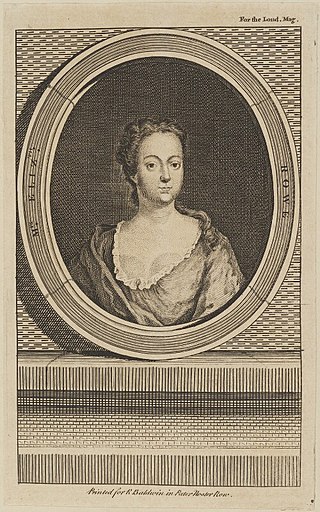
Geoffrey Chaucer was an English poet, author, and civil servant best known for The Canterbury Tales. He has been called the "father of English literature", or, alternatively, the "father of English poetry". He was the first writer to be buried in what has since come to be called Poets' Corner, in Westminster Abbey. Chaucer also gained fame as a philosopher and astronomer, composing the scientific A Treatise on the Astrolabe for his 10-year-old son, Lewis. He maintained a career in the civil service as a bureaucrat, courtier, diplomat, and member of parliament.

William Holman Hunt was an English painter and one of the founders of the Pre-Raphaelite Brotherhood. His paintings were notable for their great attention to detail, vivid colour, and elaborate symbolism. These features were influenced by the writings of John Ruskin and Thomas Carlyle, according to whom the world itself should be read as a system of visual signs. For Hunt it was the duty of the artist to reveal the correspondence between sign and fact. Of all the members of the Pre-Raphaelite Brotherhood, Hunt remained most true to their ideals throughout his career. He was always keen to maximise the popular appeal and public visibility of his works.

Robert Southwell, SJ, also Saint Robert Southwell, was an English Catholic priest of the Jesuit Order. He was also an author of Christian poetry in Elizabethan English, and a clandestine missionary in Elizabethan England.

William Manhire is a New Zealand poet, short story writer, emeritus professor, and New Zealand's inaugural Poet Laureate (1997–1998). He founded New Zealand's first creative writing course at Victoria University of Wellington in 1975, founded the International Institute of Modern Letters in 2001, and has been a strong promoter of New Zealand literature and poetry throughout his career. Many of New Zealand's leading writers graduated from his courses at Victoria. He has received many notable awards including a Prime Minister's Award for Literary Achievement in 2007 and an Arts Foundation Icon Award in 2018.

Emilia Lanier was the first woman in England to assert herself as a professional poet, through her volume Salve Deus Rex Judaeorum. Attempts have been made to equate her with Shakespeare's "Dark Lady".

Lady Jane Cavendish (1621–1669) was a poet and playwright, the daughter of William Cavendish, Duke of Newcastle and later the wife of Charles Cheyne, Viscount Newhaven. Along with her literary achievements, Cavendish helped manage her father's properties while he spent the English Civil War in exile; she was responsible for a variety of military correspondences and for salvaging many of her family's valuable possessions. Later in life, she became an important community member in Chelsea, using her resources to make improvements on Chelsea Church and otherwise benefit her friends and neighbours. Marked by vitality, integrity, perseverance and creativity, Jane's life and works tell the story of a Royalist woman's indomitable spirit during the English Civil War and the English Restoration.
Ōrongohau | Best New Zealand Poems is an annual online anthology of poems chosen by guest editors. The anthology began in 2001 and is published by the International Institute of Modern Letters at Victoria University of Wellington in New Zealand. It is supported by a grant from Creative New Zealand.

Elizabeth Melville, Lady Culross (c.1578–c.1640) was a Scottish poet.

Elizabeth Singer Rowe was an English poet, essayist and fiction writer called "the ornament of her sex and age" and the "Heavenly Singer". She was among 18th-century England's most widely read authors. She wrote mainly religious poetry, but her best-known work, Friendship in Death (1728), is a Jansenist miscellany of imaginary letters from the dead to the living. Despite a posthumous reputation as a pious, bereaved recluse, Rowe corresponded widely and was involved in local concerns at Frome in her native Somerset. She remained popular into the 19th century on both sides of the Atlantic and in translation. Though little read today, scholars have called her stylistically and thematically radical for her time.

Esther Inglis (1571–1624) was a skilled member of the artisan class, as well as a miniaturist, who possessed several skills in areas such as calligraphy, writing, and embroidering. She was born in 1571 in either London or in Dieppe and was later relocated to Scotland, where she was later raised and married. Sharing similarities with Jane Segar, Inglis always signed her work and frequently included self-portraits of herself in the act of writing. However, unlike Jane Segar, Inglis successfully established a career based on manuscript books created for royal patrons. Over the course of her life, Inglis composed around sixty miniature books that display her calligraphic skill with paintings, portraits, and embroidered covers. She mostly dedicated her books to the monarchs, Elizabeth I and James VI and I, and people in power during their reign. She died around 1624, at the age of 53.

Sir Vincent Gerard O'Sullivan was a New Zealand poet, short story writer, novelist, playwright, critic, editor, biographer, librettist, and academic. From 1988 to 2004 he was a professor of English literature at Victoria University of Wellington, and in 2013 he was appointed the New Zealand Poet Laureate.
Lady Hester Pulter (1605–1678) was a seventeenth-century writer of poetry and prose, whose manuscript was rediscovered in 1996 in the Brotherton Library, University of Leeds. Her work includes poems, which are collected in the manuscript into sections titled "Poems Breathed Forth By the Noble Hadassas" and "The Sighes of a Sad Soule Emblematically Breath'd Forth by the Noble Hadassas," and an unfinished prose romance titled "The Unfortunate Florinda."

Mildred Cecil, Baroness Burghley was an English noblewoman and translator. She was the wife of William Cecil, 1st Baron Burghley, the most trusted adviser of Elizabeth I, and the mother of Robert Cecil, 1st Earl of Salisbury, adviser to James I.
Harry Ricketts is a poet, biographer, editor, anthologist, critic, academic, literary scholar and cricket writer. He has written biographies of Rudyard Kipling and of a dozen British First World War poets.

A miscellany is a collection of various pieces of writing by different authors. Meaning a mixture, medley, or assortment, a miscellany can include pieces on many subjects and in a variety of different forms. In contrast to anthologies, whose aim is to give a selective and canonical view of literature, miscellanies were produced for the entertainment of a contemporary audience and so instead emphasise collectiveness and popularity. Laura Mandell and Rita Raley state:
This last distinction is quite often visible in the basic categorical differences between anthologies on the one hand, and all other types of collections on the other, for it is in the one that we read poems of excellence, the "best of English poetry," and it is in the other that we read poems of interest. Out of the differences between a principle of selection and a principle of collection, then, comes a difference in aesthetic value, which is precisely what is at issue in the debates over the "proper" material for inclusion into the canon.
Wendy Scase is Emeritus Geoffrey Shepherd Professor of Medieval English Literature at the University of Birmingham. Her research interests include medieval manuscript production and use; histories of literacy; and relations between medieval literature and law, politics, and religion.
Anne Southwell [née Harris], later called Anne, Lady Southwell, was a poet. Her commonplace book includes a variety of works including political poems, sonnets, occasional verse, and letters to friends.

Sarah Broom (1972–2013) was a New Zealand poet and university lecturer. Her work included two books of poetry, Tigers at Awhitu and Gleam. After her early death from lung cancer, the Sarah Broom Poetry Prize, was established to remember and celebrate her life and work.
Martha Moulsworth, born Martha Dorsett, was an English writer who spent much of her life in Hoddesdon, Hertfordshire. Her only known literary work, Memorandum of Martha Moulsworth, Widow (1632), an autobiographical poem, is one of the earliest known autobiographies in English.












